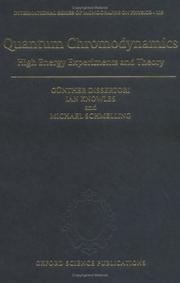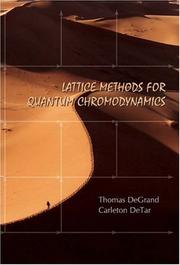| Listing 1 - 10 of 67 | << page >> |
Sort by
|

ISBN: 019100460X 9780191004605 0199566410 9780199566419 0198505728 Year: 2009 Publisher: Oxford New York Clarendon Press Oxford University Press
Abstract | Keywords | Export | Availability | Bookmark
 Loading...
Loading...Choose an application
- Reference Manager
- EndNote
- RefWorks (Direct export to RefWorks)
This text looks at Quantum Chromodynamics, the theory of the strong force between quarks, which form the building blocks of nuclear matter. With a primary focus on experiments, the authors also include an extensive theoretical introduction to the field, as well as many exercises with solutions explained in detail.
Book
ISBN: 3030672352 3030672344 Year: 2021 Publisher: Cham, Switzerland : Springer,
Abstract | Keywords | Export | Availability | Bookmark
 Loading...
Loading...Choose an application
- Reference Manager
- EndNote
- RefWorks (Direct export to RefWorks)
Book
ISBN: 0191014990 0191749141 0199652740 9780191014994 9780191749148 9780199652747 Year: 2018 Publisher: Oxford : Oxford University Press,
Abstract | Keywords | Export | Availability | Bookmark
 Loading...
Loading...Choose an application
- Reference Manager
- EndNote
- RefWorks (Direct export to RefWorks)
This title provides an in-depth introduction to the particle physics of current and future experiments at particle accelerators. The text provides the reader with an overview of practically all aspects of the strong interaction necessary to understand and appreciate modern particle phenomenology at the energy frontier.
Book
ISBN: 9781009291446 9781009291415 9781009291422 Year: 2022 Publisher: Cambridge : Cambridge University Press,
Abstract | Keywords | Export | Availability | Bookmark
 Loading...
Loading...Choose an application
- Reference Manager
- EndNote
- RefWorks (Direct export to RefWorks)
Filling a gap in the current literature, this book is dedicated to high energy quantum chromodynamics (QCD) including parton saturation and the color glass condensate (CGC). It presents groundbreaking progress on the subject and describes many problems at the forefront of research, bringing postgraduate students, theorists and interested experimentalists up to date with research in this field. The material is presented in a pedagogical way, with numerous examples and exercises. Discussion ranges from the quasi-classical McLerran-Venugopalan model to the linear BFKL and nonlinear BK/JIMWLK small-x evolution equations. The authors adopt both a theoretical and an experimental outlook, and present the physics of strong interactions in a universal way, making it useful for physicists from across high energy and nuclear physics, and applicable to processes studied at high energy accelerators around the world. This title, first published in 2012, has been reissued as an Open Access publication on Cambridge Core.
Book
ISBN: 3030954900 3030954919 Year: 2022 Publisher: Cham, Switzerland : Springer,
Abstract | Keywords | Export | Availability | Bookmark
 Loading...
Loading...Choose an application
- Reference Manager
- EndNote
- RefWorks (Direct export to RefWorks)
Book
ISBN: 9781107411395 1107411394 9780511781759 9780521889339 9780511902307 0511902301 9780511799150 0511799152 0521889332 0511850735 1107211913 1282817965 9786612817960 0511901518 0511900724 051178175X 0511797753 Year: 2010 Publisher: Cambridge ; New York : Cambridge University Press,
Abstract | Keywords | Export | Availability | Bookmark
 Loading...
Loading...Choose an application
- Reference Manager
- EndNote
- RefWorks (Direct export to RefWorks)
The advent of quantum chromodynamics (QCD) in the early 1970s was one of the most important events in twentieth-century science. This book examines the conceptual steps that were crucial to the rise of QCD, placing them in historical context against the background of debates that were ongoing between the bootstrap approach and composite modeling, and between mathematical and realistic conceptions of quarks. It explains the origins of QCD in current algebra and its development through high-energy experiments, model-building, mathematical analysis and conceptual synthesis. Addressing a range of complex physical, philosophical and historiographical issues in detail, this book will interest graduate students and researchers in physics and in the history and philosophy of science.
Quantum chromodynamics --- Algebra. --- Mathematical models. --- History. --- Chromodynamics, Quantum --- QCD (Nuclear physics) --- Particles (Nuclear physics) --- Quantum electrodynamics --- Mathematics --- Mathematical analysis

ISBN: 1281919225 9786611919221 9812773983 9789812773982 9781281919229 9789812567277 9812567275 6611919228 Year: 2006 Publisher: Hackensack, NJ : World Scientific,
Abstract | Keywords | Export | Availability | Bookmark
 Loading...
Loading...Choose an application
- Reference Manager
- EndNote
- RefWorks (Direct export to RefWorks)
Book
ISBN: 9811944415 9811944407 Year: 2022 Publisher: Beijing ; Singapore : Science Press : Springer,
Abstract | Keywords | Export | Availability | Bookmark
 Loading...
Loading...Choose an application
- Reference Manager
- EndNote
- RefWorks (Direct export to RefWorks)
Baryons. --- Quantum chromodynamics. --- Chromodynamics, Quantum --- QCD (Nuclear physics) --- Particles (Nuclear physics) --- Quantum electrodynamics --- Fermions --- Hadrons --- Heavy particles (Nuclear physics)
Book
ISBN: 3110430681 3110430606 9783110430608 3110439395 Year: 2016 Publisher: De Gruyter
Abstract | Keywords | Export | Availability | Bookmark
 Loading...
Loading...Choose an application
- Reference Manager
- EndNote
- RefWorks (Direct export to RefWorks)
The purpose of this book is to give a systematic pedagogical exposition of the quantitative analysis of Wilson lines and gauge-invariant correlation functions in quantum chromodynamics. Using techniques from the previous volume (Wilson Lines in Quantum Field Theory, 2014), an ab initio methodology is developed and practical tools for its implementation are presented. Emphasis is put on the implications of gauge invariance and path-dependence properties of transverse-momentum dependent parton density functions. The latter are associated with the QCD factorization approach to semi-inclusive hadronic processes, studied at currently operating and planned experimental facilities. Contents:IntroductionParticle Number Operators in Quantum Mechanics and in Quantum Field TheoryGeometry of Quantum Field TheoriesBasics of Wilson Lines in QCDGauge-Invariant Parton DensitiesSimplifying Wilson Line CalculationsBrief Literature GuideConventions and Reference FormulaeIntegrationsBibliographyIndex
Quantum chromodynamics. --- Partons. --- Gauge invariance. --- Gauge fields (Physics) --- Fields, Gauge (Physics) --- Gage fields (Physics) --- Gauge theories (Physics) --- Field theory (Physics) --- Group theory --- Symmetry (Physics) --- Gage invariance --- Gauge transformations --- Invariance, Gauge --- Electromagnetism --- Transformations (Mathematics) --- Parton model --- Hadrons --- Particles (Nuclear physics) --- Quarks --- Chromodynamics, Quantum --- QCD (Nuclear physics) --- Quantum electrodynamics --- QCD factorization. --- Wilson lines and loops. --- gauge-invariance. --- parton density functions. --- perturbative calculations in QCD. --- transverse-momentum dependence.
Book
ISBN: 9780521631488 0521631483 9781107424753 9780511711817 9780511722516 0511722516 9780511712364 0511712367 0511711816 1107207290 9781107207295 1139636367 9781139636360 1283149435 9781283149433 0511713193 9780511713194 9786613149435 6613149438 0511714440 9780511714443 0511715692 9780511715693 1107424755 Year: 2010 Publisher: Cambridge, UK ; New York : Cambridge University Press,
Abstract | Keywords | Export | Availability | Bookmark
 Loading...
Loading...Choose an application
- Reference Manager
- EndNote
- RefWorks (Direct export to RefWorks)
Aimed at graduate students and researchers in theoretical physics, this book presents the modern theory of strong interaction: quantum chromodynamics (QCD). The book exposes various perturbative and nonperturbative approaches to the theory, including chiral effective theory, the problems of anomalies, vacuum tunnel transitions, and the problem of divergence of the perturbative series. The QCD sum rules approach is exposed in detail. A great variety of hadronic properties (masses of mesons and baryons, magnetic moments, form factors, quark distributions in hadrons, etc.) have been found using this method. The evolution of hadronic structure functions is presented in detail, together with polarization phenomena. The problem of jets in QCD is treated through theoretical description and experimental observation. The connection with Regge theory is emphasized. The book covers many aspects of theory which are not discussed in other books, such as CET, QCD sum rules, and BFKL.
Elementary particles --- Quantum mechanics. Quantumfield theory --- Quantum chromodynamics --- Chromodynamique quantique --- Quantum chromodynamics. --- Chromodynamique quantique. --- Chromodynamics, Quantum --- QCD (Nuclear physics) --- Particles (Nuclear physics) --- Quantum electrodynamics
| Listing 1 - 10 of 67 | << page >> |
Sort by
|

 Search
Search Feedback
Feedback About UniCat
About UniCat  Help
Help News
News